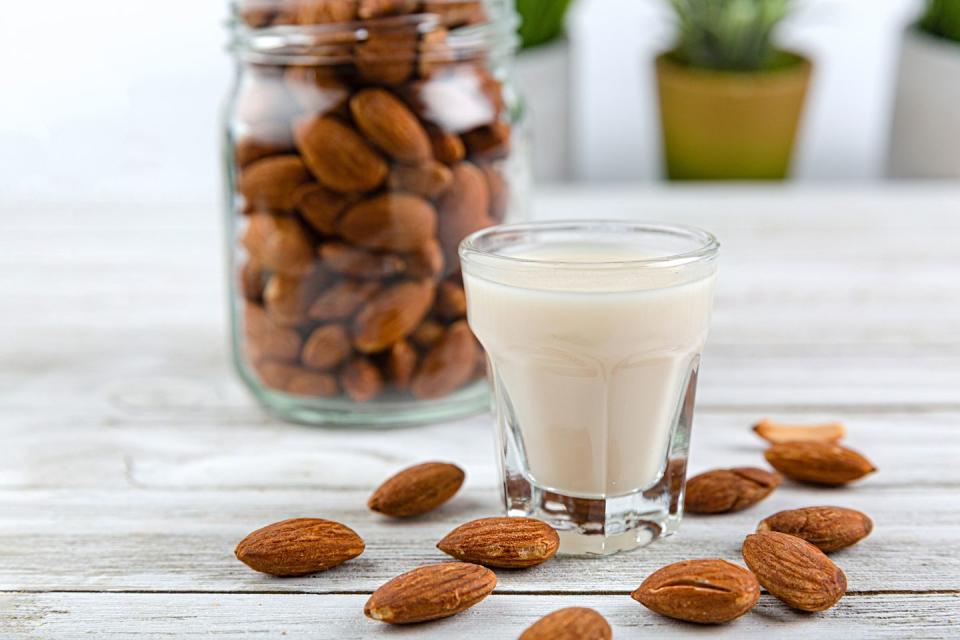Dietitians Weigh In on Whether You Should Be Drinking Oat Milk or Almond Milk

"Hearst Magazines and Yahoo may earn commission or revenue on some items through the links below."
Whether you're a vegan, have lactose intolerance or milk allergies, or simply don't like the taste and/or texture of cow's milk, there are tons of milk alternatives to choose from these days.
But with plant-based brands offering a wider variety than ever of milked nuts and legumes, in an array of flavors, fat contents and sweetness levels, knowing which option is best can be tough. So we asked nutrition experts to give us the low-down on two of the most popular: almond milk and oat milk.
Almond milk, which has been around since the Middle Ages, "is a versatile plant-based milk alternative that simultaneously provides a wealth of nutrients,” according to Bonnie Taub-Dix, R.D.N., creator of BetterThanDieting.com. "Those who are kosher may also appreciate almond milk since it can be used in recipes that can be eaten when dairy would not otherwise be permitted."
Oat milk, first produced in the 1990s, "is a nice 'entryway' milk alternative,” says Frances Largeman-Roth, R.D.N., nutrition expert and author of Smoothies & Juices: Prevention Healing Kitchen. “It has a texture and mouthfeel that’s very similar to cow’s milk, and the flavor is very neutral.”
While neither packs quite as powerful a nutritional punch as cow’s milk — which is full of essential nutrients like protein, fat (except for skim), calcium and vitamins D and A — each boasts some nice dietary benefits. So which came out on top in our head-to-head comparison?
Almond Milk vs. Oat Milk: Nutrition
Overall, the main differences between almond and oat milk are energy (calories) and carbohydrates, with almond milk offering less of each. Oat milk also contains slightly higher amounts of fiber, protein, and fat than almond milk. Some brands, like Almond Breeze and Oatly, fortify their beverages with the key micronutrients found in cow’s milk, making both options significant sources of calcium, vitamin D, and vitamin A.
Here are the nutrition details for one cup of Blue Diamond’s Almond Breeze and Oatly’s unsweetened and refrigerated versions of their milks:
Almond Milk
Calories: 30
Fat: 2.5 grams
Protein: 1 gram
Carbohydrates: 1 gram
Sodium: 170 milligrams
Fiber: less than 1 gram
Calcium: 450 milligrams (35% of the recommended daily value -DV)
Vitamin D: 5 micrograms (25% of the DV)
Vitamin A: 160 micrograms (20% of the DV)
Oat Milk
Calories: 120
Fat: 5 grams
Protein: 3 grams
Carbohydrates: 16 grams
Sodium: 100 milligrams
Fiber: 2 grams
Calcium: 350 milligrams (25% of the DV)
Vitamin D: 3.6 micrograms (20% of the DV)
Vitamin A: 150 micrograms (15% of the DV)
Almond milk pros and cons

Pros
Almond milk is a good plant-based milk choice for people with lactose intolerance or milk or soy allergies and vegans.
One cup of Blue Diamond’s Almond Breeze unsweetened milk provides 7.5 milligrams of vitamin E, which is 50% of the DV. “Almond milk is an excellent source of the antioxidant vitamin E which may help maintain one’s immune health and lower the risk for heart disease,” says Keri Gans, R.D.N., author of The Small Change Diet and podcast host of The Keri Report.
It is lower in carbohydrates than cow’s milk, which may make it a good option for people with diabetes, especially if they want to consume carbohydrates from other sources at mealtimes.
Almond milk naturally contains heart-healthy unsaturated fats which can help with managing cholesterol levels.
Cons
Almond milk is not appropriate for people with tree nut allergies since almonds fall under the category.
It is low in both protein and calories. Almond milk provides the lowest amount of calories of all plant-based milks. Despite what diet culture says, calories are units of energy, and it’s important we meet our energy needs at each meal.
Not all almond milk brands fortify their milk with the micronutrients (vitamins and minerals) that cow’s milk provides, including vitamins D and A, and phosphorous and calcium.
Almond milk is not the most environmentally-friendly choice, as it requires a significantly high amount of water to produce.
Oat milk pros and cons

Pros
Oat milk is a good plant-based option for vegans, and people with lactose intolerance, milk, soy, or nut allergies. “Because it’s tree nut-, peanut- and soy-free, most people can drink oat milk,” says Gans.
Oat milk contains fiber. “Fiber may help decrease cholesterol levels, prevent constipation, and provide satiety,” says Gans.
It may be better for the environment, generating fewer greenhouse gases and using less water than other milks.
Oat milk can offer other important micronutrients. One cup of Oatly’s milk contains 50% of the DV for vitamin B12 and 20% of the DV for phosphorus. Vitamin B12 is important for things like neurological functioning and red blood cell formation, and phosphorous is necessary for healthy bones and teeth.
Cons
Oat milk prices are more than double the cost of cow’s milk.
Like almond milk brands, not all oat milk brands fortify their milk with calcium and phosphorous, and vitamins D and A. If you purchase milk without the micronutrients, it is important to ensure you consume them elsewhere.
While it has a bit more protein than almond milk, oat milk is still relatively low in protein, a macronutrient with multiple essential functions.
To ensure blood sugar stability, oat milk’s higher carbohydrate content may require people with diabetes to be mindful of balancing the milk with a protein and/or fat source, like a handful of nuts within a snack or an omelet within a meal.
Bottom line: Is oat milk or almond milk better for you?
At the end of the day, choosing which milk alternative is better for you can be as simple as going with what like more and find the most useful in your kitchen.
“Almond milk and oat milk aren’t that far apart in their nutritional break-downs, with oat milk being a little higher in protein and fiber and almond milk lower in calories,” Gans says. "A bigger difference would be taste and versatility."
Of course, there are exceptions related to health conditions. For instance, if you have a nut allergy, oat milk is obviously your better option. Or if you prefer to drink milk on its own (without a protein source) and you have diabetes, almond milk is likely your better choice.
The best uses for almond milk and oat milk
Since oat milk and almond milk have different textures and tastes, each has its natural culinary fit.
“Oat milk has a creamier consistency and lends itself better to lattes and cappuccinos, and its natural sweetness is better for baking,” says Gans. Like Gans, Largeman-Roth says she uses oat milk in sweeter foods and beverages like banana bread, muffins, pancakes, lattes, and hot chocolate. “It also works in savory creations, as long as you choose unsweetened,” says Largeman-Roth. “It blends well with other ingredients and doesn’t have any off flavors.”
On the other hand, almond milk’s subtly nutty taste makes it ideal for more savory foods like pasta sauces and mashed potatoes — particularly the unsweetened version. Gans likes it in cereal, and both Gans and Taub-Dix suggest using it in smoothies. Depending on how sweet and flavorful you like your smoothies, you can use the sweetened, unsweetened, vanilla, or chocolate versions. “Although I enjoy Almond Breeze as is in a glass, it pairs deliciously with any fruits or veggies when swirled into a smoothie,” says Taub-Dix.
Tips for buying almond and oat milks
Here are some factors to consider when making your choices in the milk aisle:
Make sure it’s fortified with certain micronutrients. This goes for both types of milk since cow’s milk naturally provides calcium and phosphorous, and vitamins D and E. “If you’re avoiding dairy, it’s easy to miss out on these key bone-building and immune-supporting nutrients,” says Largeman-Roth.
Consider your grocery budget. All plant-based milks are more expensive than cow’s milk, so consider which alternative makes sense and if adjustments need to be made elsewhere in your grocery budget. “Since price can vary, I suggest comparison shopping to include cost,” says Gans. If you are buying milk alternatives without medical necessity like lactose intolerance, you can choose to buy oat milk and/or almond milk in rotation with cow's milk.
Keep protein in mind. While it is unnecessary to hyperfocus on protein, it is a macronutrient our bodies and brains need regularly. Since both kinds of milk are relatively low in protein, you may need to add another protein source to your grocery cart to balance your meals and/or snacks. “If you’re looking for a plant milk with more protein, you should look for one that is a blend of oats and pea protein, like Ripple’s Oatmilk+ Protein, which has six grams of protein per serving,” says Largeman-Roth.
Consider cross-contamination. Although oats are gluten-free, they may be processed at facilities that also process gluten-containing foods. “Make sure to buy an oat milk that is certified gluten-free by a third party,” says Largeman-Roth.
Keep culinary uses and shelf-life in mind. Consider the above common uses for each milk and decide which meals, snacks, or drinks in which you are most likely to use your plant-based milk. Then, consider how long you want your milk to last. “It’s also a great idea to buy foods that have an extended shelf life,” says Taub-Dix, who stocks up on shelf-stable almond milk which can be stored for up to one year (unopened), while its refrigerated version lasts up to 10 days or so.
Ask yourself what you like. It is an often-forgotten fact: consuming foods and beverages is not only about fueling our bodies and brains. It is one significant way to experience pleasure in life, so, all things considered, choose the milk you enjoy.
You Might Also Like

